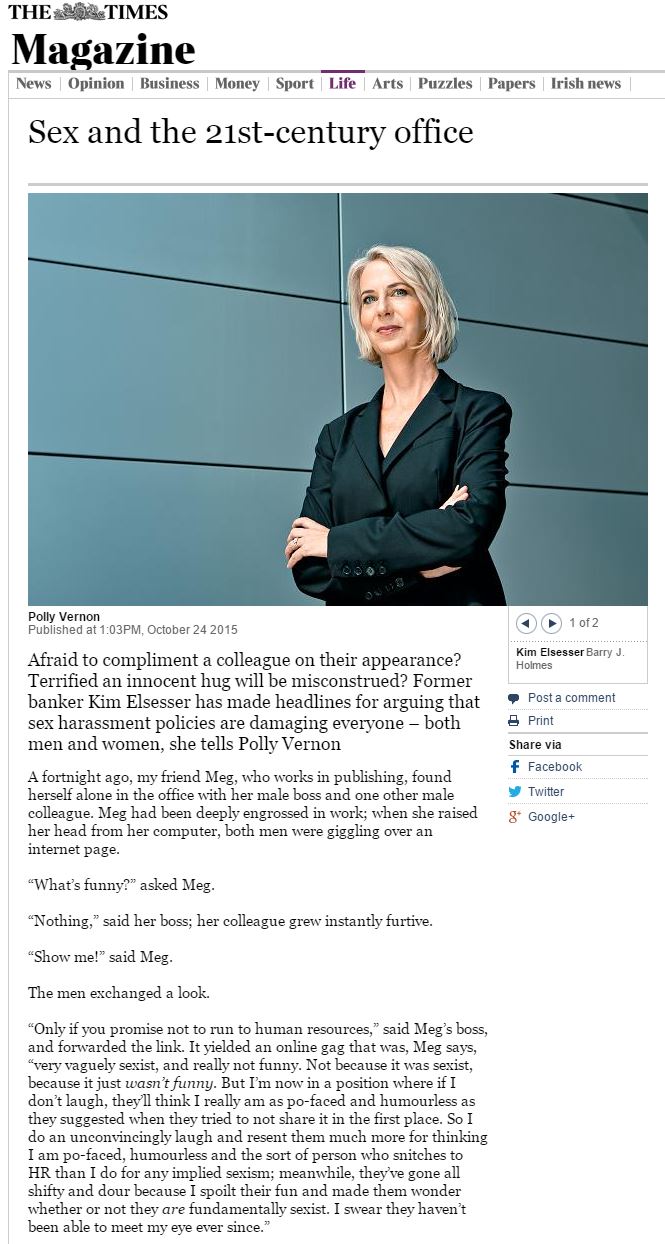My New Posts Are Now Appearing On Forbes.com – Please follow me at forbes.com/sites/kimelsesser!
An excerpt from The Times (London) piece on Sex and the Office
Consent

Last week, sexual harassment allegations surfaced against renowned UC Berkeley astronomer Geoff Marcy. Four women alleged that Marcy repeatedly engaged in inappropriate physical behavior with students, including unwanted massages, kisses, and groping. Isn’t it time we start teaching employees how to get consent prior to making advances?
With all the time that coworkers spend together it’s natural that some romantic attraction will surface. Research shows that mere repeated exposure to another person increases our attraction to them. And in the workplace, coworkers are likely to share common interests as well. As a result, sparks tend to fly, and about half of employees report that they have participated in a workplace romance at some point in their career.
Despite the high numbers of employees who are fraternizing at work, very few organizations provide guidelines for their employees on how to professionally navigate these relationships. Instead, most policies simply discourage employees from developing romantic or sexual interest in their coworkers.
Workplace romance gets especially complicated, because sexual advances are only considered sexual harassment if they are unwelcome. One of the most common questions regarding sexual harassment involves just this distinction – “How do you know if sexual attention is unwanted unless you try?”
Indeed, this was the defense of former San Diego mayor Bob Filner. Twenty women felt his alleged sexual advances were unwelcome. One alleged victim of his come-ons described to KPBS News that Filner “reached over to kiss me, I turned my head, and at that moment, on the side of my face, I got a very wet saliva-filled kiss including feeling his tongue on my cheek.” Filner blamed his actions on hubris. In other words, he thought his kisses and gropes would be welcomed.
So, how do employees determine if their sexual advances are desired? Get consent. If the allegations against them are true, a simple “Can I kiss you?” would have saved Bob Filner, Geoff Marcy and their victims a lot of headaches. But, do employees know how to obtain consent? Sadly, many don’t.
Employees need to learn how to signal their interest and gain acceptance before asking for dates or sex or kisses or anything romantic or sexual in nature. In lieu of having employees go in for the awkward grope, the uncomfortable kiss, or the unwanted touch, employees should have a professionally accepted way to garner pre-approval.
Individuals could no longer suggest that provocative dress was a signal of consent or that a coworker was sending signals suggesting sexual interest. Interest would have to be confirmed.
If consent is declined, then the employee must accept this conclusion and cannot repeat the invitation. A response of “no” would have to mean no. While obtaining written consent may take some of the romance out of the early phase of a relationship, having the consent on paper will also serve to protect the organization and the couple from legal hassles.
Consent needs to become the policy when it comes to workplace romance. And organizations need to step up to help their employees navigate these often awkward interactions.
Top Women’s Websites
 I was looking for a place to write a blog to promote my new book, and so turned to Forbes list of the 100 best websites for women. If you are wondering why women have not reached parity with men in the workplace, you need not look much farther than this list. The websites are mostly produced by women for women, but the titles of the websites alone suggest that women don’t take themselves seriously. And the content suggests we’re still living in the 1950’s. Here’s a sampling of the top websites for women according to Forbes:
I was looking for a place to write a blog to promote my new book, and so turned to Forbes list of the 100 best websites for women. If you are wondering why women have not reached parity with men in the workplace, you need not look much farther than this list. The websites are mostly produced by women for women, but the titles of the websites alone suggest that women don’t take themselves seriously. And the content suggests we’re still living in the 1950’s. Here’s a sampling of the top websites for women according to Forbes:
Babble (Not so bad when I found out it was aimed at Mom’s)
ChicCEO
City Girl Confidence (Could you imagine a website called City Boy Confidence?)
Corporette – Fashion, lifestyle and career advice for overachieving chicks. (The feature story today was about a secret sale at Nordstrom)
DianeGottsman, Modern manners and etiquette expert. (Feature story today – Nine Ways to Pumpkin Spice Your Office)
Frustrated, I stopped searching. But, the girly names and topics for women’s interest sites aren’t just limited to the web. The original publisher of my book was skirt! (the exclamation point is not mine, it’s actually part of the publisher’s name). I appreciate all the hard work of the employees at skirt!, but am relieved that my new publisher has a less embarrassing name. Could you imagine a publisher of books of interest to men called Pants!?
Nobel Laureate Resigns After Comments on Workplace Romance
 Nobel Laureate Tim Hunt found himself in hot water this week when he suggested that sexual or romantic attraction was an issue for male and female scientists working together. “I have fallen in love with people in the lab and people in the lab have fallen in love with me,” Hunt reported. So chastised was he for his comments on this issue, that he resigned from his position as an honorary professor at University College London. But my research suggests that Hunt is correct on this point. Romance is a big issue in the workplace, and one we can’t ignore if we want to eliminate the gender pay gap and provide women equal opportunity to reach the top levels of corporations.
Nobel Laureate Tim Hunt found himself in hot water this week when he suggested that sexual or romantic attraction was an issue for male and female scientists working together. “I have fallen in love with people in the lab and people in the lab have fallen in love with me,” Hunt reported. So chastised was he for his comments on this issue, that he resigned from his position as an honorary professor at University College London. But my research suggests that Hunt is correct on this point. Romance is a big issue in the workplace, and one we can’t ignore if we want to eliminate the gender pay gap and provide women equal opportunity to reach the top levels of corporations.
Surveys find that between 40 and 60 percent of us report we’ve had a romance at work. Why are we unable to resist our coworkers? Coworkers see each other every day, and that alone can increase attraction. Those that work together also typically share a common interest in their chosen field. Finding a potential mate with a keen interest in cell division, Hunt’s field, might have been challenging if he sought to meet women at the local pub or by searching on Match.com.
Nonetheless, coworker romances are fraught with problems for both the employees and the organization. In addition to issues of favoritism that arise in boss-subordinate relationships, complications can also arise at work when only one of the pair is interested in pursuing a relationship, or when a relationship blossoms and then goes sour. Organizations aiming to avoid these issues typically discourage their employees from becoming romantically entangled.
However, I believe one of the biggest issues surrounding workplace romance doesn’t involve romance at all – but instead results in the exclusion of women. Since, even the mere suggestion of romantic interest can get employees in trouble at work, workers tend to avoid unnecessary interactions with the opposite sex so that no possible misinterpretation is possible. Workplace romance is so taboo that men, who still run most of our companies, prefer to stick with other men when it comes to business trips, dinners or late night meetings. Women are excluded so as not to suggest any impropriety. This exclusion leaves women with less opportunities for advancement at work.
Last month, female congressional staffers made news when they reported they were not permitted to meet alone with the male congressmen, were excluded from events so as not to appear in too many photos with their congressmen, and were barred from driving their congressmen around town to avoid the appearance of impropriety. This exclusion extends to the corporate world as well, with one survey indicating that nearly two-thirds of senior executive men are reluctant to have a one-on-one meeting with a junior female employee. Women also describe difficulties developing valuable mentor relationships. No eyebrows are raised when a senior male executive mentors a junior male employee. However, when a senior male executive takes a junior female employee under his wing, rumors can fly. Often it’s easier for the male executive to limit his mentoring to other men.
These issues surrounding romantic attraction create a barrier between the sexes at work that I’ve labeled “the sex partition.” If we want to eliminate the gender pay gap, we need to break down this partition between male and female coworkers. Lately, the sources of the gender pay gap have been a hot topic, yet the issues of sex and attraction are rarely raised when we talk about causes of this disparity. Nonetheless, I suspect most women and men can identify with this problem, and see its harmful effects for women in the workplace.
Clearly, the exclusion of women is not acceptable, nor is the unwelcome pursuit of relationships, but what can we do? Cultural anthropologist and writer Margaret Meade suggested that that only the complete eradication of workplace romance would allow both sexes to work productively together. Unfortunately, it’s futile to attempt to completely eliminate romance at work. Hunt’s suggestion that we segregate the sexes at work is equally impractical (not to mention ridiculous). However, that doesn’t mean we give up.
Instead of ignoring these issues, and chastising those who raise them, we need to get them out in the open. We need to teach employees how to professionally navigate issues surrounding workplace romance. While “ a professional workplace romance” may seem like an oxymoron, it’s not. There are plenty of steps that organizations can take to help employees pursue relationships in a professional manner. Many of these practical steps for organizations and employees are outlined in my forthcoming book, Sex and the Office. A more open and professional approach to these relationships will also alleviate the threat that friendliness toward a female colleague will be misinterpreted as romantic interest. Organizations must also make it clear to employees that excluding women for any reason is discriminatory.
The critical first step in eradicating problems stemming from workplace romance is to start a dialog on these issues. Although Hunt’s delivery was a little uncoventional, and his proposed solution a little Victorian, we should at least appreciate his shedding light on this important problem.
The Dark Side of Title IX
 Title IX has been a boost for women in sports. The number of women in college sports has exploded since 1972 when the law was enacted (the law forced equal funding for men’s and women’s sports in organizations that receive federal funding). But, for some women, Title IX has been anything but helpful.
Title IX has been a boost for women in sports. The number of women in college sports has exploded since 1972 when the law was enacted (the law forced equal funding for men’s and women’s sports in organizations that receive federal funding). But, for some women, Title IX has been anything but helpful.
For female coaches, Title IX has been a red card. In 1972, the year that Title IX was enacted, 90% of women’s college teams were coached by women. By 2012, a mere 43% of these teams were coached by women. It turns out the same law enacted to protect women’s sports, has cut jobs for female coaches. Why? As a result of Title IX, universities were forced to offer significantly higher salaries to coaches of women’s sports. Suddenly, men were interested in these jobs. And they were hired.
Men are now coaching 57% of women’s sports. (In case you’re wondering, women coach a whopping 2% of men’s collegiate sports). What’s most interesting about this trend is that it defies the most common theories about why women are not advancing in the workplace. The argument that women aren’t interested in these jobs or that women are still making their way through the pipeline, clearly don’t apply here. Women were interested in coaching and were in the coaching pipeline back in 1972.
So, why did men land these jobs after the pay increased? One reason is that university athletic directors are still predominantly male, and they hired other men to fill the jobs. Don’t believe me? Schools that have female athletic directors have significantly more female coaches. A second reason is that despite Title IX, sports is still considered a man’s domain. When you picture a coach, it’s likely to be a man. If a man applies for the job, he’s more likely to be hired.
Assistant coaches are another story. Women represent 57.1% of paid assistant coaches of women’s teams. Some think this statistic provides a glimmer of progress, but, I’m not convinced. Sadly, it seems women don’t have trouble landing the role of “assistant”.
Statistics on percentages of female coaches in university athletics can be found here.
Microsoft CEO Tells Women They Shouldn’t Ask For a Raise
I like to think that we’re past blatant forms of sexism at work. Don’t get me wrong, there’s still plenty of gender discrimination, but I’d like to think it’s more subtle these days. On Thursday, Microsoft CEO Satya Nadella proved me wrong. He told female technology employees that if they ask for a raise they won’t be trusted. His exact words:
It’s not really about asking for the raise, but knowing and having faith that the system will actually give you the right raises as you go along. And that, I think, might be one of the additional superpowers that quite frankly women who don’t ask for a raise have. Because that’s good karma. It’ll come back, because somebody’s going to know that’s the kind of person that I want to trust. That’s the kind of person that I want to really give more responsibility to.
He said this out loud… While he was on stage… Addressing a group of female technologists celebrating women in computing. After his talk, someone most likely pointed out to him that this was an insanely stupid comment (not to mention potentially illegal and actionable). Nadella retracted, stating his comment was “completely wrong.”
Traditionally, people don’t like those who behave counter to their gender stereotypes (or counter to how their gender is expected to behave). Men are supposed to be the aggressive sex – climbing corporate ladders, assuming leadership positions, and asking for raises. Women are supposed to be nice and not rock the boat. Asking for a raise isn’t ladylike. Therefore, women who ask for raises can’t be trusted.
It’s one thing to have these stereotypes impact your decisions without your conscious awareness, it’s a whole different ballgame when you recommend to women that they should adhere to these stereotypes.
The worst part is that he’s a smart guy. He’s the CEO of one of the largest companies in the world. Yet, despite all the discussion on the gender pay gap, particularly in the field of technology, he didn’t realize that his comments would be inappropriate. He actually thought he was dishing out some valuable advice.
And, as for karma? Judging by the Twitter response to his comments, Nadella may have some karma problems of his own to deal with.
Hats Off to Women at Baseball Games
At a Dodgers game recently, my son asked me why I didn’t have to take off my baseball cap. As always, the game opened with the traditional singing of the national anthem. And, as always, the anthem was preceded by the announcement: “We ask you to rise for the national anthem, and we ask that men remove their hats.” It seemed like a logical question – Why don’t women have to remove their caps?
I explained to him that this tradition started when women used to pin their hats into their hair, and it would have been a big production for women to take their hats off. But almost all of the hat-wearing women at the baseball game were donning baseball caps. Same as the men. I told him I honestly didn’t know why we the tradition remained – I certainly think women can handle taking caps off to show respect to the country.
Why make a big deal about this? After all, women can still remove their hats if they so desire. Like so many other things I carp about, it’s the messages sent by this tradition that causes problems. The first message is that women are so different from men, we need to develop gender-specific traditions, even when it comes to singing our national anthem. The second message is that women are somehow more fragile than their male counterparts, unable to remove their cap or afraid to mess their hair. Neither of these messages are good for women.
Believe it or not, Congress revisited protocol for the singing of the national anthem only seven years ago (see 36 USC 301), yet they didn’t modify the men-only cap removal rule. Our present Congress has pledged to address the gender pay gap – that is, they’re figuring out why women in the US are paid less than men for the same jobs. I see these two as linked. If we start treating women and men equally in our social traditions, perhaps the workplace will begin to follow suit.
Unintentional Discrimination is Still Discrimination
If a chemical plant inadvertently dumps poisonous chemicals in a local water source, they’re liable. If a restaurant inadvertently causes food poisoning in its customers, it’s liable. Yet, if a company inadvertently pays women less than men? In many cases, this isn’t a problem.
That’s why bills like the one recently proposed in Louisiana are so important. The Louisiana law would make unintentional discrimination illegal. Right now, for private businesses in the state, only intentional discrimination is illegal. In other words, “Oh, I didn’t realize women in my organization only make half what their male peers make,” is a legitimate excuse for paying women less.
The state already bans unintentional discrimination under the Equal Pay for Women Act passed last year. Now Democrats are trying to expand the law to cover private businesses. Louisiana does not have a great record on this issues, as women in the state take home only 67 cents for every dollar earned by a man. This law is a big step in the right direction.
If there is one thing that women tell me when I interview them about sex discrimination at work, it’s that it’s subtle. Subtle, subtle subtle. There’s obviously nothing in writing saying women should receive less money because of their gender. No policies stating men should get promoted ahead of women. If you have to prove intent, you might as well give up.
Businesses need to be responsible for their own ignorance on this one. Let’s hope the Louisiana dems can get this passed.
Carl’s Jr’s Burgers Are For Men Only – And I’m OK With That
According to a new ad from Carl’s Jr, even female superheroes are no match for the Carl’s Jr. Burger (view ad here). In the ad, the female superhero transforms into a human man, and we’re instructed that we need to “man up” to consume the burger.
I hate the phrase “man up,” and typically have a negative reaction to anyone who suggests women can’t do everything men can do. But I’m not sure how I feel about this one – maybe I should be feeling bad for the boys this time. After all, marketing artery-clogging, high salt, high fat burgers exclusively to men may be worse for men than women. For once, I think I’m happy women are left out.






